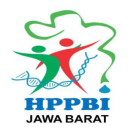The Effectiveness of Virtual Reality Media Assisted by Millealab on The Cognitive Abilities of Junior High School Students on The Concept of Virus
DOI:
https://doi.org/10.37150/rebion.v5i2.2946Abstract
Background: Education plays an important role in shaping a highly skilled workforce. In the era of technological advancement, especially in the field of education, new opportunities are emerging for the advancement of more innovative and efficient teaching methodologies. Virtual reality (VR) stands out as an important technology in this regard. Its utilization in educational settings offers an engaging and interactive learning experience, with the potential to enhance the understanding of abstract concepts, especially in secondary school settings. Methods: The study was conducted to Class IX at SMP Muhammadiyah 1 Sukabumi with a total of 10 students. The instruments used in this study were cognitive ability questions. Data analysis using hypothesis testing through SPSS version 29. Results: the use of Virtual Reality media assisted by Millealab has an effect on the Cognitive ability of Junior High School Students on the Virus Concept with a significance value of 0.001. The average N-Gain achievement on cognitive ability indicators is 0.45 (medium). Indicator C1 (knowing) has the highest N-Gain value of 0.53 and indicator C3 (applying) has the lowest N-Gain of 0.39. Conclusion: Virtual Reality media assisted by Millealab can improve the cognitive abilities of junior high school students on the concept of viruses.
Keywords : Virtual Reality; Millealab; Viruses
Downloads
Published
How to Cite
Issue
Section
License
Copyright (c) 2024 Fadhil Fauzan, Suhendar Setiana

This work is licensed under a Creative Commons Attribution-NonCommercial-ShareAlike 4.0 International License.









